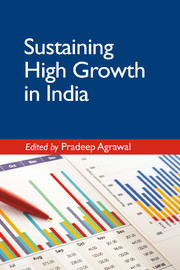Book contents
- Frontmatter
- Contents
- List of Tables
- List of Graphs and Maps
- Preface
- Introduction
- Section 1 Ensuring Macroeconomic Stability for Sustaining High Growth Rates
- Section 2 Promoting Industrial Development for Sustaining High Growth Rates
- Section 3 The International Economic Issues and Sustaining High Growth
- 6 Global Recession and the Eurozone Debt Crisis: Impact on Exports of India and China
- 7 Changing Global Trade Regime and Emergence of Mega FTAs: Strategy for India's External Sector Sustainability
- 8 Economic Impact of Foreign Capital Inflows in Emerging Asia
- 9 FDI Outflows from the BRIC Countries: Impact on Domestic Capital Formation
- Section 4 Infrastructure Bottlenecks to Sustaining High Growth
- Section 5 Some Socio-political Issues in Sustaining High Growth
- List of Contributors
- Obituary
- Index
9 - FDI Outflows from the BRIC Countries: Impact on Domestic Capital Formation
from Section 3 - The International Economic Issues and Sustaining High Growth
Published online by Cambridge University Press: 08 February 2018
- Frontmatter
- Contents
- List of Tables
- List of Graphs and Maps
- Preface
- Introduction
- Section 1 Ensuring Macroeconomic Stability for Sustaining High Growth Rates
- Section 2 Promoting Industrial Development for Sustaining High Growth Rates
- Section 3 The International Economic Issues and Sustaining High Growth
- 6 Global Recession and the Eurozone Debt Crisis: Impact on Exports of India and China
- 7 Changing Global Trade Regime and Emergence of Mega FTAs: Strategy for India's External Sector Sustainability
- 8 Economic Impact of Foreign Capital Inflows in Emerging Asia
- 9 FDI Outflows from the BRIC Countries: Impact on Domestic Capital Formation
- Section 4 Infrastructure Bottlenecks to Sustaining High Growth
- Section 5 Some Socio-political Issues in Sustaining High Growth
- List of Contributors
- Obituary
- Index
Summary
INTRODUCTION
The phenomenon of rising FDI outflows has raised serious policy concerns about its effects on the domestic investment in the countries of origin of such FDI flows. A review of the available theoretical and empirical literature on the association between domestic investment and Outward FDI (OFDI) provides two distinct economic views regarding the effect of OFDI on the home country investment – substitutability and complementarity, each of which has its own implications on domestic economic growth and employment. Policy concerns become especially pronounced when OFDI tends to substitute those domestic investments that could have sustained and enhanced home productivity. The argument is that if overseas relocation of domestic production takes place because of reduced investment opportunities at home, then such OFDI activities may not only shift some of the production activities from home to foreign destinations, but also possibly threaten the availability of scarce financial resources at home by allocating resources abroad (Stevens and Lipsey, 1992). This has the potential to reduce the domestic productivity of home firms in the long run by lowering their rate of accumulation of physical capital, thereby impairing their domestic investment. This in turn affects the long run rate of economic growth and employment of the country (Al-Sadig, 2013). On the other hand, it is also recognized that OFDI can actually be instrumental in fostering positive linkages with the country of origin through the employment of domestic inputs and promotion of domestic investment in the manufacturing and service (information technology, management, etc.,) sectors while producing outputs in the host country. Such an increase in the OFDI activities by home country multinationals may promote higher domestic investment and output, leading to long run economic growth (Desai et al., 2005a).
In view of the controversies existing in the relevant theoretical and empirical literature about the potential impact of OFDI on domestic investment, the study of the direction of causality between these two macroeconomic variables become theoretically important and practically relevant because of the inherent growth and developmental implications of OFDI for the home countries and also for the rest of the world.
- Type
- Chapter
- Information
- Sustaining High Growth in India , pp. 257 - 292Publisher: Cambridge University PressPrint publication year: 2017



